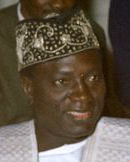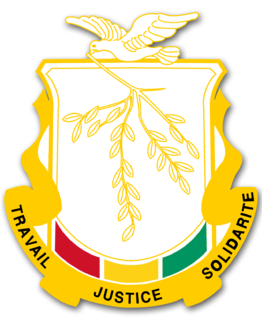Mali is located in Africa. The history of the territory of modern Mali may be divided into:

Omar Hassan Ahmad al-Bashir is a Sudanese politician who is currently serving as the seventh president of Sudan and was the head of the National Congress Party. He came to power in 1989 when, as a brigadier in the Sudanese Army, he led a group of officers in a military coup that ousted the democratically elected government of prime minister Sadiq al-Mahdi after it began negotiations with rebels in the south. Since then, he has been elected three times as President in elections that have been under scrutiny for electoral fraud. In March 2009, al-Bashir became the first sitting president to be indicted by the International Criminal Court (ICC), for allegedly directing a campaign of mass killing, rape, and pillage against civilians in Darfur.

Modibo Keïta was the first President of Mali (1960–1968) and the Prime Minister of the Mali Federation. He espoused a form of African socialism.
The Rassemblement Démocratique Africain, commonly known as the RDA and variously translated as African Democratic Assembly and African Democratic Rally, was a political party in French West Africa and French Equatorial Africa which was important in the decolonization of the French empire. The RDA was composed of different political parties throughout the French colonies in Africa and lasted from 1946 until 1958. At certain points, the RDA was the largest political party in the colonies in Africa and played a key role in the French government headed by the Democratic and Socialist Union of the Resistance (UDSR). Although the regional party largely dissolved in 1958 with the independence votes for the colonies, many of the national parties retained the RDA in their name and some continue to do so. The political ideology of the party did not endorse outright secession of colonies from France, but it was anti-colonial and pan-Africanist in its political stances.

The Mali Federation was a federation in West Africa linking the French colonies of Senegal and the Sudanese Republic for a period of only two months in 1960. It was founded on 4 April 1959 as a territory with self-rule within the French Community and became independent after negotiations with France on 20 June 1960. Two months later, on 19 August 1960, the Sudanese Republic leaders in the Mali Federation mobilized the army and Senegal leaders in the federation retaliated by mobilizing the gendarmerie which resulted in a tense stand-off and the withdrawal from the federation by Senegal the next day. The Sudanese Republic officials resisted this dissolution, cut off diplomatic relations with Senegal, and defiantly changed the name of their country to Mali. For the brief existence of the Mali Federation, the premier was Modibo Keïta, who would become the first President of the Republic of Mali after the Mali Federation dissolved, and its government was based in Dakar, Senegal.

The decolonisation of Africa took place in the mid-to-late 1950s and 1960s, with sudden and radical regime changes on the continent as colonial governments made the transition to independent states; this was often quite unorganized and marred with violence and political turmoil. There was widespread unrest and organised revolts in both Northern and sub-Saharan colonies, especially in French Algeria, Portuguese Angola, the Belgian Congo and British Kenya.

The French Community was an association of former French colonies, mostly from Africa. In 1958 it replaced the French Union, which had itself succeeded the French colonial empire in 1946.
African Socialist Movement was a political party in French West Africa. The MSA was formed following a meeting of the Section française de l'Internationale ouvrière (SFIO) federations of Cameroon, Chad, the Republic of the Congo, French Sudan, Gabon, Guinea, Niger, Oubangui-Chari, and Senegal; the meeting was held in Conakry from 11 January to 13 January 1957. At that meeting it was decided that the African federations would break with its French parent organisation and form the MSA.

The Sudanese Communist Party , is a communist party in the Republic of the Sudan. Founded in 1946, it was a major force in Sudanese politics and one of the two most influential communist parties in the Arab world. In 1971, President Gaafar Nimeiry launched a wave of repression against the party after a failed coup implicated the involvement of some communist military officers. The party's best known leaders; Abdel Khaliq Mahjub, Joseph Garang, Alshafi Ahmed Elshikh, Babkir Elnour and Hashem al Atta were executed and the party was officially banned, but some SCP politicians did manage to enter the government.

Territorial Assembly elections were held in French Sudan on 31 March 1957, the first elections in the territory to be held under universal suffrage. The result was a victory for the Sudanese Union – African Democratic Rally. which won 57 of the 70 seats. Voter turnout was just 34.0%.

Elections to the French National Assembly were held Guinea on 2 January 1956, as part of the wider French elections. The Democratic Party of Guinea – African Democratic Rally won two of the three seats with the African Bloc of Guinea winning the other seat.

Territorial Assembly elections were held in Chad on 30 March 1952. The result was a victory for Gaullist parties, with the Rally of the French People winning all 15 seats in the First College and the Chadian Democratic Union winning 24 of the 30 seats in the Second College.

Elections to the French National Assembly were held in French Sudan on 10 November 1946 as part of the wider French parliamentary elections. Three members were elected, with the Sudanese Progressive Party winning two seats and the Sudanese Union – African Democratic Rally one.

Elections to the French National Assembly were held in French Sudan on 17 June 1951 as part of the wider French parliamentary elections. Four members were elected, with the Sudanese Progressive Party winning three and the Sudanese Union – African Democratic Rally one.

Elections to the French National Assembly were held in French Sudan on 2 January 1956 as part of the wider French parliamentary elections. Four members were elected, with the Sudanese Progressive Party (PSS) and the Sudanese Union – African Democratic Rally (US–RDA) winning two each. Mamadou Konaté and Modibo Keïta were elected on the US–RDA list, whilst Fily Dabo Sissoko and Hamadoun Dicko were elected for the PSS.

A by-elections to the French National Assembly was held in French Sudan on 8 July 1956 following the death of Mamadou Konaté of the Sudanese Union – African Democratic Rally (US−RDA), one of the territory's four MPs. US−RDA candidate Baréma Bocoum was elected.

The Union of Nigerien Independents and Sympathisers was a political party in Niger.











